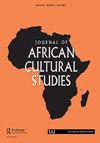The Labor of the Living Dead
IF 0.9
2区 社会学
Q2 CULTURAL STUDIES
引用次数: 0
Abstract
ABSTRACT This article develops the concept of the labor of the living dead through readings of recent Senegalese films, novels, comics, and music videos in Wolof and French. The undead have been resurgent in cultural production for decades but these are not your average zombies: they do not inspire collective dread nor are they directed by opaque, outside forces. In Senegal, the focus has more often been on the work of the undead. This enigmatic concept speaks to the pervasive and potentially fatal mismatch between discourses of entrepreneurial self-realization and the crushing limitations and dangers imposed on many by their present circumstances. In representations of undead labor, projects of normative self-improvement devour and outlive the selves they are meant to improve, generating affects of shame and powerlessness and sparking violence toward more marginalized lives. Alongside these dynamics, though, the figure of undead work also seems to contain a grain of counter-hegemonic imagination, even affording visions of alternatives to existing configurations of labor and humanity. Central to this phenomenon is a tendency to exploit the polysemy of the Wolof term liggéey, which means work in a conventional sense but which also refers in certain contexts to witchcraft or gendered labor.活死人的劳动
摘要本文通过阅读塞内加尔最近的电影、小说、漫画和音乐视频(沃洛夫语和法语),发展了活死人的劳动概念。几十年来,亡灵在文化生产中死灰复燃,但它们不是普通的僵尸:它们不会引发集体恐惧,也不会受到不透明的外部力量的指挥。在塞内加尔,人们更多地关注亡灵的工作。这个神秘的概念说明了创业自我实现的话语与许多人目前所处的环境所带来的巨大局限和危险之间普遍存在的潜在致命的不匹配。在不死劳工的表现中,规范性自我完善的项目吞噬并超越了他们本应改善的自我,产生了羞耻感和无力感,并引发了对更边缘化生活的暴力。然而,除了这些动态之外,亡灵作品的形象似乎还包含着一种反霸权的想象,甚至为现有的劳动力和人类配置提供了替代方案。这一现象的核心是倾向于利用沃洛夫语liggéey一词的多义性,该词在传统意义上意味着工作,但在某些情况下也指巫术或性别劳动。
本文章由计算机程序翻译,如有差异,请以英文原文为准。
求助全文
约1分钟内获得全文
求助全文
来源期刊

Journal of African Cultural Studies
Multiple-
CiteScore
1.70
自引率
10.00%
发文量
13
期刊介绍:
The Journal of African Cultural Studies publishes leading scholarship on African culture from inside and outside Africa, with a special commitment to Africa-based authors and to African languages. Our editorial policy encourages an interdisciplinary approach, involving humanities, including environmental humanities. The journal focuses on dimensions of African culture, performance arts, visual arts, music, cinema, the role of the media, the relationship between culture and power, as well as issues within such fields as popular culture in Africa, sociolinguistic topics of cultural interest, and culture and gender. We welcome in particular articles that show evidence of understanding life on the ground, and that demonstrate local knowledge and linguistic competence. We do not publish articles that offer mostly textual analyses of cultural products like novels and films, nor articles that are mostly historical or those based primarily on secondary (such as digital and library) sources. The journal has evolved from the journal African Languages and Cultures, founded in 1988 in the Department of the Languages and Cultures of Africa at the School of Oriental and African Studies, London. From 2019, it is published in association with the International African Institute, London. Journal of African Cultural Studies publishes original research articles. The journal also publishes an occasional Contemporary Conversations section, in which authors respond to current issues. The section has included reviews, interviews and invited response or position papers. We welcome proposals for future Contemporary Conversations themes.
 求助内容:
求助内容: 应助结果提醒方式:
应助结果提醒方式:


